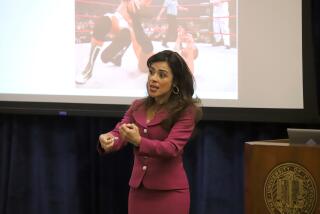Self-Esteem: Good Concept, Bad Rap
- Share via
For the past year, Frankie M. Curry has run a roving motivational training program to build Los Angeles elementary school students’ self-esteem. During weekly 60-minute sessions, Curry, 53, runs through etiquette, self-esteem and self-expression exercises with the students in their classrooms. As a former juvenile probation officer and once an abused child, Curry said her own youthful experiences and her previous jobs sparked her interest in working with young children. Curry, who works part-time as a counselor at Los Angeles Mission College and uses part of that income to fund her program, spoke with LUCILLE RENWICK about her reasons for starting her program and what she believes students need to succeed.
*
I grew up being told by family that I was ugly and nothing, a nobody. No one raised me with encouraging words. However, I was fortunate because what I didn’t get from people at home, I got from outside influences--teachers at school, counselors and social workers. One lady at my high school took me under her wing. Another lady at a training school would bring in magazines and tell me to always dress well, be presentable and work hard. She used to tell me that I was smart and that I would be someone important.
It was the encouragement from that community of people that gave me confidence in myself. And I think it’s that same type of community involvement that’s missing from children’s lives today and that we need to put back into their lives. So, it was the combination of my experiences in my youth and what I’ve seen happening to kids today that made me interested in putting this program together.
In my jobs as a probation officer and with the housing department, I saw some kids going through the same things that I went through. I just felt there had to be something done to reach them. To save them the pain of believing for so many years that they were nothing.
What I’m trying to do is to show them that they are something. That they’re special. The best way to do that is to first work on having them repeat it over and over. I have them recite affirmations, facing one another with their arms stretched out and looking into the other child’s eyes: “I am special.” “I am adorable.” “I am respectable.” “I’m kind.”
They’re given descriptions like unique and beautiful and talented and I teach them to remember these names and refer to themselves with these [words].
There are many, many programs that talk about self-esteem, but very few programs teach children about self-love and self-respect. These children have been repeating to themselves--and have had it drummed into their heads over time--that they’re not smart or important. That’s the image inner-city kids have of themselves.
Some people say that it’s very narcissistic to focus on self. But that’s what we learn as adults, to take care of ourselves first in order to take care of others. It’s the same for children. They also learn a better sense of responsibility and learn to stop blaming other children or persons for things that they should be responsible for.
When I worked for the probation department down on Crenshaw, I saw some real problem kids. But I also saw a lot of kids who came from families where they weren’t exposed to one positive thing in their lives. And these weren’t killers or gangbangers or anything. These were kids who shoplifted something from a store or stuff like that. Children tell me that why they have problems and why they act up is that nobody cares. These young people think nobody cares about them and that’s not true.
I can remember [during] my childhood, my great aunt only went to my school when I got into a fight just to tell them that I did it. She never sat down with me to pick up a book. You don’t think the same type of thing happens to so many of these young inner-city children in these inner-city schools today? It’s the same thing. And these high school kids, they’ll write down about themselves: “I don’t feel I’m important.” Now, is that any way for a child to grow up feeling?
My whole purpose is to bring the students to a point where they’ll have fewer disciplinary problems and that they’ll come to school and want to learn rather than feeling like they’re there because they have to learn.
More to Read
Sign up for Essential California
The most important California stories and recommendations in your inbox every morning.
You may occasionally receive promotional content from the Los Angeles Times.










